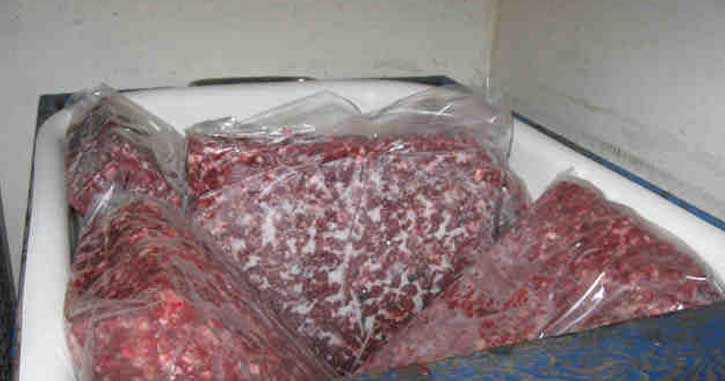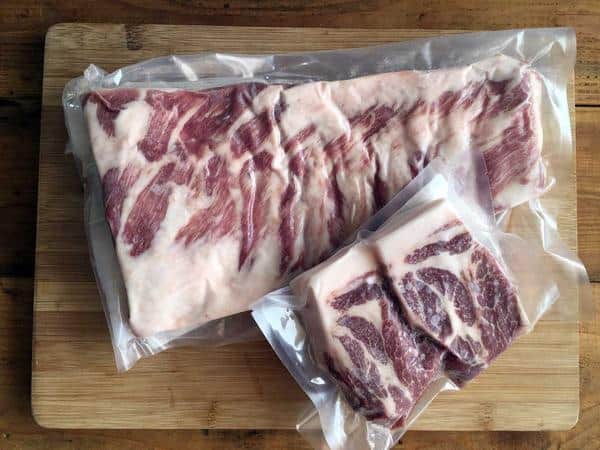Our canine companions have evolved on high-meat diets since time immemorial. In fact, their digestive systems have become used to getting the most from this type of diet. Generally, dogs need high-protein diets and meats tend to be a better source than plants because they contain higher levels of essential amino acids.
When it comes to choosing meat for your dog, there are several factors that you need to account for—one of the most important ones being quality. Free-range and human-grade meats are the best because they will usually be of higher quality. On the flip side, poor quality meats like those with added chemicals and hormones can have detrimental effects on your Fido’s health.
To help you choose high quality meat for your pup, we will explore one type of meat that is often talked about in many canine circles: 4D meats.
What are 4D Meats?

4D is a common term in the animal feed industry, and is often used to denote the source or quality of meat. The 4Ds in the name stand for dead, diseased, dying or disabled animals. This simply means that meats are not obtained from slaughtered animals. Instead, they are derived from animals that are found dead, diseased, or euthanized. They are also obtained from butcher shop trimmings, and expired meats from restaurants and grocery stores.
For starters, 4D meats are meant for rendering—a process of converting waste animal tissues into industry-grade animal proteins that are used in the manufacture of a wide range of products, including animal feed ingredients, cosmetics, varnishes, paints, soaps, leather, textiles, toothpastes, lubricants, and pharmaceuticals.
So, as you may have guessed, 4D meats are not fit for human consumption. Instead, they are considered to be “feed” ingredients. In fact, edible human-grade meats that are included while they are being processed are also considered to ‘feed-grade. ’
And feed grade ingredients don’t have to be derived from healthy animals, inspected/approved by the USDA or preserved with natural preservatives. This means that there is no issue if they contain chemicals with known risks like BHA, BHT, Ethoxyquin, etc
While 4D meats are known to be unfit for human consumption, they are acceptable as animal feeds. And some pet owners knowingly or unknowingly allow their fur babies to sample them. In fact, racing dogs are often fed 4D meats for short-term benefits—to supply them with a lot of fats within a short period because they need lots of calories.
Is It Safe to Feed Your Dog with 4D Meats?

The short answer is NO. 4D meats are not safe for your pet. Here is why:
- Diseases: Dying or diseased animals have worm-infested organs, cancerous tumors, and a wide range of diseases, which they can easily transfer to your pet. Remember that these animals don’t have to pass any kind of test to be considered fit for human consumption.
- Denaturing Agents: USDA regulations state that any beef leaving rendering plants must be denatured. Denaturing is done to ensure that the meat doesn’t get processed, packed or sold mistakenly as human food. Denaturing agents vary a lot and can be as simple as a charcoal additive or a concoction of different dyes and chemicals. By feeding these meats to your dog, they will also be ingesting these harmful chemicals. As aforementioned, 4D meats also contain other chemicals that are known to be harmful to pets like BHA, BHT, and ethoxyquin. Past studies have shown that these chemicals are not only carcinogenic but also have the potential to cause kidney and liver damage in dogs.
- Poor Quality Fats: 4D meats contain rancid and poor-quality fats which can cause a wide range of chronic health conditions in dogs, including loss of cognitive functions.
- Harmful Medications: 4D meats also expose your pup to harmful medications like steroids, antibiotics, and sodium pentobarbital (that is often used to euthanize animals). Remember that some of these medications not only remain in the systems of these animals for a long time after they are dead but the rendering process doesn’t also neutralize them.
What about Blood Meals in Dog Foods? Is Blood Meal Good For Dogs?
By definition, blood meal or animal plasma is essentially blood (derived from animals) that is dried and powdered. They are often used to supplement diets based on plant by-products, cereals, and forages. In particular, it is touted to be a perfect protein source in animal production diets for cattle, sheep, poultry, fish, and pigs.
Many pet owners also believe that they add essential nutrients to dogs. In fact, some pet food companies market them as blood concentrates containing 300% more protein than normal, fresh meat. But are these claims true? Is blood meal good for dogs?
Well, blood meal that is sourced from healthy livestock may be included in pet food without any issue. However, blood products from unknown sources are not good for your dog’s health. Allowing your pup to gulp down blood meals from unknown sources is akin to setting him for nasty bouts of diarrhea, vomiting, and pancreatitis.
Some types of blood meals can also expose your dog to BSE (mad cow disease). While there are not scientific reports of dogs contracting BSE, it is believed that it can mutate and affect them.
Finally, some brands of blood meals are fortified with iron. While iron is essential for dogs, in excess amounts, it can cause iron toxicity. Common symptoms of iron toxicity include diarrhea, vomiting, and GI tract bleeding.
Final Thoughts
4D meats are incredibly cheap, which is why most dog food manufacturers will use them to make pet food. But these types of meat pose great health risks to your dog. Whether it’s through the chemical-laden denaturing agents or because of the disease they can transfer to your pet, there are plenty of reasons to stay away from these meats. Always interrogate your dog food supplier and only buy from trustworthy vendors who have the best interest of animals.
Related Posts:
The Truth about Dog Food: 42 Dog Food Facts Every Caring Dog Owner Must Know.
As an Amazon Associate, we may receive a small commission from qualifying purchases but at no extra cost to you. Learn more. Amazon and the Amazon logo are trademarks of Amazon.com, Inc, or its affiliates.

